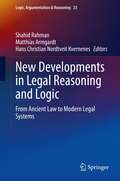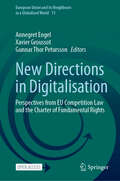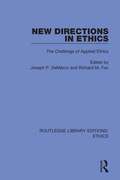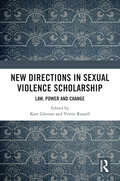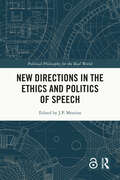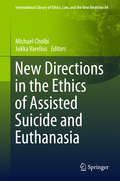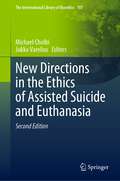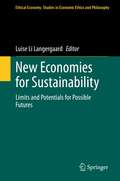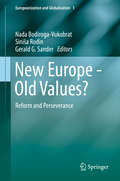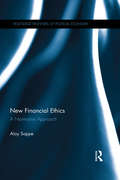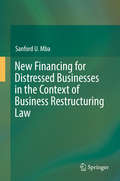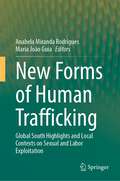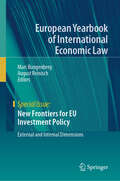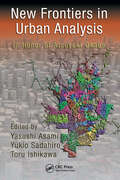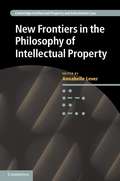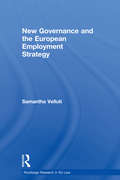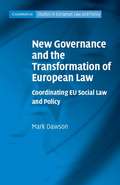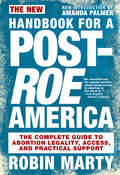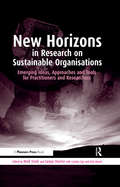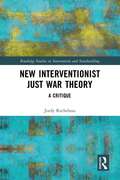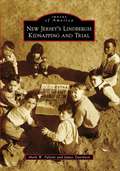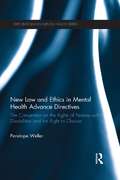- Table View
- List View
New Developments in Legal Reasoning and Logic: From Ancient Law to Modern Legal Systems (Logic, Argumentation & Reasoning #23)
by Shahid Rahman Matthias Armgardt Hans Christian Nordtveit KvernenesThis book intends to unite studies in different fields related to the development of the relations between logic, law and legal reasoning. Combining historical and philosophical studies on legal reasoning in Civil and Common Law, and on the often neglected Arabic and Talmudic traditions of jurisprudence, this project unites these areas with recent technical developments in computer science. This combination has resulted in renewed interest in deontic logic and logic of norms that stems from the interaction between artificial intelligence and law and their applications to these areas of logic. The book also aims to motivate and launch a more intense interaction between the historical and philosophical work of Arabic, Talmudic and European jurisprudence. The publication discusses new insights in the interaction between logic and law, and more precisely the study of different answers to the question: what role does logic play in legal reasoning? Varying perspectives include that of foundational studies (such as logical principles and frameworks) to applications, and historical perspectives.
New Directions in Digitalisation: Perspectives from EU Competition Law and the Charter of Fundamental Rights (European Union and its Neighbours in a Globalized World #13)
by Annegret Engel Xavier Groussot Gunnar Thor PeturssonThis open access book brings together experts from both EU competition law as well fundamental rights backgrounds, discussing the most recent developments in EU legislation on digitalisation. Most prominently, it explores the recently introduced Digital Markets Act (DMA), including a discussion on other related legislative acts and the respective case law. It is aimed mostly at academics and researchers in the area of digitalisation, EU competition law, and the EU Charter, but will also provide some useful insights from practitioners in the field. The internet has long been neglected and exempt from being regulated at EU level. In particular, this concerns the application of fundamental rights. The specific challenges for the digital sphere are numerous; worldwide scope, easy access, interoperability, rapid technological change, fluctuating market conditions, anonymity, disinformation, lack of traceability and thus enforcement, to name but a few. Fundamental EU values, in particular including democracy and the respect for human rights, have suffered as a direct result of these growing problems in the digital sphere. More recently, however, the EU has started to actively regulate the new technologies in order to avoid European values being undermined by an unregulated internet. In the specific field of competition law, the development of new technologies has created many challenges and raised questions for the legislator how to regulate big market players: their cross-border nature, vicissitudes, and enormous market powers allow some of them to be able to escape legal scrutiny under the current set of ex-post rules. The DMA now introduces an ex-ante mechanism for competition law and claims to be aligned with the procedural and institutional rights granted under the Charter, which will be scrutinised and challenged by the various contributions in this book.
New Directions in Ethics: The Challenges in Applied Ethics
by Joseph P. DeMarco Richard M. FoxOriginally published in 1986, this book examines the extent to which existing ethical theory can provide an adequate framework for the resolution of practical moral issues. The contributors, all leading moral philosophers, provide an authoritative and comprehensive account of developments in ethical theory, with emphasis on issues in applied ethics. They explain the dominant ethical theories, survey major field of applied ethics and speculate about the future of ethics.
New Directions in Sexual Violence Scholarship: Law, Power and Change
by Kate Gleeson and Yvette RussellThis edited collection brings together leading and emerging scholars in the important field of sexual violence scholarship. The last ten years have witnessed an international reckoning on sexual violence, typified in the mainstream imagination by the #MeToo movement, acknowledgement of the violence of university campus life, and the overdue recognition of the enduring harms of child sexual abuse. While the state has been forced to respond through law and other political processes, at times revealing its agility and at other times its archaic investment in the past, much of the real work responding to sexual violence and abuse has taken place within communities, and in the personal responses of the individuals writing the scripts of their experiences. This volume explores the nuances of these individual experiences and considers how they are shaped and reflected by intersecting axes of power including gender, race, class, age and able-bodied status. It reflects on law and law reform in the area and suggests new modes and frames through which to explain and understand sexual violence and institutional responses to it. Debates within this contested personal and political arena do not map onto longstanding binaries of liberal and radical feminism, nor conservative and progressive politics. This interdisciplinary volume traces that murky terrain and features some of the leading international scholars writing on sexual violence in English today. This book will appeal to scholars and students across the broad disciplines of law and legal studies; criminology; gender studies; political science and sociology.
New Directions in the Ethics and Politics of Speech (Political Philosophy for the Real World)
by J. P. MessinaThis book features new perspectives on the ethics and politics of free speech. Contributors draw on insights from philosophy, psychology, political theory, journalism, literature, and history to respond to pressing problems involving free speech in liberal societies. Recent years have seen an explosion of academic interest in these topics. However, most recent work has focused on constitutional protections for free speech and on issues related to academic freedom and campus politics. The chapters in this volume set their sights more broadly on the non-state problems that we collectively face in attempting to realize a healthy environment for free discourse. The volume’s contributors share the assumption that threats to free speech do not come exclusively from state sources or bad actors, but from ordinary strategic situations in which all may be acting in good faith. Contributors take seriously the idea that our current cultural moment provides plenty of reason to be concerned about our intellectual climate and offer new insights for how to make things better. New Directions in the Ethics and Politics of Speech will be of interest to researchers and students working in ethics, political philosophy, social theory, and law. The Open Access version of this book, available at www.taylorfrancis.com, has been made available under a Creative Commons Attribution-Non Commercial-No Derivatives 4.0 license.
New Directions in the Ethics of Assisted Suicide and Euthanasia
by Michael Cholbi Jukka VareliusThis book provides novel perspectives on the ethical justifiability of assisted dying. Seeking to go beyond traditional debates on topics such as the value of human life and questions surrounding intention and causation, this volume promises to shift the terrain of the ethical debates about assisted dying. It reconsiders the role of patient autonomy and paternalistic reasons as well as the part proposed for medical professionals and clinical ethics consultation in connection with assisted dying, relates the debate on assisted dying to questions about organ-donation and developments in medical technology, and demonstrates the significance of experimental philosophy in assessing questions of assisted dying. This book is ideal for advanced courses in bioethics and health care ethics.
New Directions in the Ethics of Assisted Suicide and Euthanasia (The International Library of Bioethics #103)
by Michael Cholbi Jukka VareliusThis book provides novel perspectives on ethical justifiability of assisted dying in the revised edition of New Directions in the Ethics of Assisted Suicide and Euthanasia. Going significantly beyond traditional debates about the value of human life, the ethical significance of individual autonomy, the compatibility of assisted dying with the ethical obligations of medical professionals, and questions surrounding intention and causation, this book promises to shift the terrain of the ethical debates about assisted dying. The novel themes discussed in the revised edition include the role of markets, disability, gender, artificial intelligence, medical futility, race, and transhumanism. Ideal for advanced courses in bioethics and healthcare ethics, the book illustrates how social and technological developments will shape debates about assisted dying in the years to come.
New Economies for Sustainability: Limits and Potentials for Possible Futures (Ethical Economy #59)
by Luise Li LangergaardThe edited volume New Economies for Sustainability: Limits and Potentials for Possible Futures brings together a range of alternative views on economy and organization to illustrate different perspectives on how to work towards more sustainable solutions to production, consumptions and economic organization more generally. The book brings chapters from the most renowned scholars in the field, who bring their perspectives on how alternative schools theorize politics, society, organization, nature and ethics in their attempts to develop theories with a strong focus on sustainability. The book aims to contribute with a platform for gathering and collecting these theories in a pluralist economic framework, which can provide a strong alternative voice to mainstream economic theories in sustainability debates.
New Europe - Old Values?
by Siniša Rodin Nada Bodiroga-Vukobrat Gerald SanderThis book explores the reactions to Europeanization and globalization in times of economic distress, including the transformation of European values in national legal cultures. The authors explore how European values, tradition and new legal challenges interconnect and dictate the paths of transition between old and new Europe. The first chapter starts with a question: can Roman Legal Tradition play a role of identity factor towards a New Europe? Can it be considered as a general value identifying new Europe, built on a minimum core of principles - persona, dominum, obligation, contract and inheritance - composing the whole European private law tradition? Subsequent chapters attempt to provide possible responses to the question: what is Europe today? The answers diverge, depending on the research area. The inherent dichotomy of human rights protection in Europe and the concept of 'one law, one court' are investigated in the second chapter, whereas the third chapter focuses on asylum and the interrelation and interdependence of the Court of Justice of the EU and the European Court of Human Rights. The next three chapters concentrate on matters of equal treatment and non-discrimination. The first contribution in this part reflects on the crisis and methodological and conceptual issues faced by modern anti-discrimination law. It is followed by a specific analysis of the empowerment of women or gender-balancing in company boards. The third contribution reveals the impact of the Croatian anti-discrimination law on private law relations. The next chapter deals with the issue of social rights in Croatia and the method of their regulation in the context of the new European values. The immense challenges posed by the market integration imperative and democratic transition have brought about different reactions in the national legal systems and legal cultures of both old and new Member States. As such, Europe has effectively been reunited, but what about the convergence of national legal cultures? This is the focal point of the remaining chapters, which focus on various issues, from internal market, competition law, consumer welfare, liberalization of network industries to the EU capital market. The magnitude of EU activity in these areas offers conclusive evidence that old and new paradigms are evolving and shaping the future of the EU.
New Financial Ethics: A Normative Approach (Routledge Frontiers of Political Economy)
by Aloy SoppeFollowing the internationalisation, globalisation and deregulation of the financial market over the last few decades, the financial sector has evolved from a servicing industry into an initiating and leading sector in the international industrialised economy. The power of the financial sector, including Credit Rating Agencies, determines the creditworthiness of companies and countries. Today’s financial sector dominates instead of serving the real economy, which puts substantial pres - sure on all the agencies involved, not least the banks, to make the profits that will drive economic growth. As a result of this pressure, moral conduct in the financial sector has been put under severe strain. This book examines the experience of the recent financial crisis and argues that a firmer ethical grounding for the financial sector is required to prevent the crisis being repeated. The book offers a model for making judgements on financial markets, institutions and products. The model is built on seven major criteria which are examined in depth: Justice, Nature, Sustainability, Legality, Risk and Return, the Stakeholder model and Monism. This multidisciplinary approach integrates philosophy, economics and law to arrive at a new normative approach to financial ethics. This book is a must-read for finance students at academic levels but also for professionals in the financial sector, who can be helped by implementing the model of NFE in solving financial dilemmas.
New Financing for Distressed Businesses in the Context of Business Restructuring Law
by Sanford U. MbaThis book focuses on the restructuring of distressed businesses, emphasizing the need for new financing during the restructuring process as well as during relaunch, and examines the role of law in encouraging creditor confidence and incentivizing lending. It describes two broad approaches to encouraging new finance during restructuring: a prescriptive one that seeks to attract credit using expressly defined statutory incentives, and a market-based one that relies on the business judgment of lenders against the backdrop of transaction avoidance rules.Securing new financing for a distressed business is a critical part of successful restructuring. Without such financing, the business may be unable to meet interim liquidity constraints, or to implement its restructuring plans. This book addresses related questions concerning the place of new financing as an essential component of restructuring.In general terms, the book explores how statutory interventions and the courts can provide support with contentious issues that arise from the provision of new financing, whether through new financing agreements or through distressed debt investors, who are increasingly gaining prominence as sources of new financing for distressed businesses. It argues that courts play a key part in preventing or correcting the imbalances that can arise from the participation of distressed debt investors. In this context, it critically examines the distressed debt market in emerging markets like Nigeria and the opportunity presented by non-performing loans, arguing that the regulatory pattern of market entry may dis-incentivize distress debt investing in a market that is in dire need of financing. The book offers a fresh and comparative perspective on restructuring new financing for distressed businesses by comparing various approaches (primarily from the US, UK and Germany) and drawing lessons for frontier markets, with particular reference to Nigeria. It fills an important gap in international comparative scholarship and discusses a living problem with both empirical and policy aspects.
New Forms of Human Trafficking: Global South Highlights and Local Contexts on Sexual and Labor Exploitation
by Maria João Guia Anabela Miranda RodriguesThis book analyses new forms of human trafficking taking into account the transposition of the Directive 2011/36/UE which sets out minimum standards to be applied throughout the European Union in preventing and combating trafficking in human beings and protecting its victims. Sexual exploitation of trafficked persons is at its highest rate. After COVID-19, new forms of sexual exploitation have been identified, specifically in the Global South. The book analyses new forms of exploitation used by traffickers to coerce victims. Combining the perspectives of academic researchers with those of highly skilled professionals from governmental institutions, this book is a unique contribution, promoting collaboration in preventing and combating human trafficking crime, and in raising awareness of this ongoing problem.
New Frontiers for EU Investment Policy: External and Internal Dimensions (European Yearbook of International Economic Law)
by August Reinisch Marc BungenbergWith the entry into force of the Treaty of Lisbon in 2009, the EU became a global actor in the field of foreign direct investment. Since then, the field of EU investment policy has been gradually shaped by numerous political changes, judgments and opinions delivered by the Court of Justice of the EU, as well as lively scholarly debate. Today, a clear division between the “internal” and “external” dimensions of EU investment policy has emerged, which constitutes the general topic of this book. Within these dimensions, additional – and sometimes contradictory – facets of the EU’s multi-layered approach to investment protection can be identified. On the one hand, EU investment policy is shifting toward a decentral approach when it comes to substantive standards of investment protection. On the other hand, the EU is following a multilateral approach with regard to procedural innovations in investor-State dispute settlement.In this EYIEL Special Issue, leading experts in the field discuss the latest developments with regard to the above-mentioned dimensions and facets, which reflect new trends and challenges for EU investment policy. Among others, the book discusses the EU’s participation in the reform process for the international investment regime, the emergence of central planning and decentral implementation of EU investment policy, the feasibility of an intra-EU investment court, the protection and enforcement of investment standards under EU law, and the suitability of mediation as an alternative to intra-EU investment arbitration.
New Frontiers in Urban Analysis: In Honor of Atsuyuki Okabe
by Toru Ishikawa Yukio Sadahiro Yasush I AsamiBringing together the world's leading experts in Urban Analysis, this remarkable and critically acclaimed volume applies the theories and models of Atsuyuko Okabe, Japan's preeminent spatial analyst, to case studies in urban planning, transport, administration, and public health in the context of the highly advanced Japanese planning system. It inc
New Frontiers in the Philosophy of Intellectual Property
by Annabelle LeverAre intellectual property rights a threat to autonomy, global justice, indigenous rights, access to lifesaving knowledge and medicines? The essays in this volume examine the justification of patents, copyrights and trademarks in light of the political and moral controversy over TRIPS (the Agreement on Trade-Related Aspects of Intellectual Property Rights). Written by a distinguished international group of experts, this book draws on the latest philosophical work on autonomy, equality, property ownership and human rights in order to explore the moral, political and economic implications of property rights in ideas. Written with an interdisciplinary audience in mind, these essays introduce readers to the latest debates in the philosophy of intellectual property, whether their interests are in the restrictions that copyright places on the reproduction of music and printed words or in the morality and legality of patenting human genes, essential medicines or traditional knowledge.
New Ghosts, Old Ghosts: Prisons and Labor Reform Camps in China (Socialism And Social Movements Ser.)
by Michael R Anderson James D. SeymourMuch has been written about the laogai (sometimes likened to the Soviet gulag) in the People's Republic of China. Depending on the source, the prisons are described as nonexistent, enlightened institutions, or hellish places that subject the inmates to degradation and misery. The system is commonly thought of (by admirers and critics alike) as having a measurable impact on the national economy and providing significant resources to the state. Based on research in classified documents and extensive interviews with former prisoners, judicial personnel, and other insiders, and featuring case studies dealing with the three northwestern provinces, this book examines such assertions on the basis of the facts about this underexamined subject in order to arrive at a detailed, objective, and realistic picture of the situation. In the case of each province under study, the authors discuss the history of the provincial prison system and the impact that each has had at the macro, meso, and micro levels.
New Governance and the European Employment Strategy (Routledge Research in EU Law)
by Samantha VellutiIn recent years new or experimental approaches to governance in the EU, namely the Open Method of Coordination (OMC), have attracted great interest and controversy. This book examines the European Employment Strategy (EES) and its implementation through the OMC, exploring the promises and limitations of the EES for EU social law and policy and for the safeguard of social rights. This significant and timely work offers new insights and fresh perspectives into the operation of New Governance and its relationship with both European and national law and constitutionalism. This book will be of great interest to academics, researchers and postgraduate students working in European law – specifically in the field of EU employment law and gender equality – and European governance studies in general.
New Governance and the Transformation of European Law
by Mark DawsonThe development of non-binding new governance methods has challenged the traditional ideals of EU law by suggesting that soft norms and executive networks may provide a viable alternative. Rather than see law and new governance as oppositional projects, Mark Dawson argues that new governance can be seen as an example of legal 'transformation', in which soft norms and hard law institutions begin to cohabit and interact. He charts this transformation by analysing the Open Method of Coordination (OMC) for Social Inclusion and Protection. While this process illustrates some of the concrete advantages for EU social policy which new governance has brought, it also illustrates their extensive legitimacy challenges. Methods like the OMC have both excluded traditional institutions, such as Courts and Parliaments, and altered the boundaries of domestic constitutional frameworks. The book concludes with some practical suggestions for how a political 'constitutionalisation' of new governance could look.
New Handbook for a Post-Roe America: The Complete Guide to Abortion Legality, Access, and Practical Support
by Robin MartyA completely new edition--with a new introduction by Amanda Palmer--of Robin Marty's best-selling manual on what to do if/when Roe v. Wade is overturned.The New Handbook for a Post-Roe America is a comprehensive and user-friendly manual for understanding and preparing for the looming changes to reproductive rights law, and getting the health care you need. Activist and writer Robin Marty guides readers through various worst-case scenarios of a post-Roe America, and offers ways to fight back, including: how to acquire financial support, how to use existing networks and create new ones, and how to, when required, work outside existing legal systems. She details how to plan for your own emergencies, how to start organizing now, what to know about self-managed abortion care with pills and/or herbs, and how to avoid surveillance. The only guidebook of its kind, The New Handbook for a Post-Roe America includes new chapters that cover the needs and tools available for pregnant people across the country. This second edition features extensively updated information on abortion legality and access in the United States, and approximately one hundred pages of new content, covering such topics as independent alternatives to Planned Parenthood, "auntie networks," taxpayer-funded abortions, and using social media wisely in the age of surveillance.
New Histories of American Law: Making Foreigners
by Kunal M. ParkerThis book reconceptualizes the history of US immigration and citizenship law from the colonial period to the beginning of the twenty-first century by joining the histories of immigrants to those of Native Americans, African Americans, women, Asian Americans, Latino/a Americans and the poor. Parker argues that during the earliest stages of American history, being legally constructed as a foreigner, along with being subjected to restrictions on presence and movement, was not confined to those who sought to enter the country from the outside, but was also used against those on the inside. Insiders thus shared important legal disabilities with outsiders. It is only over the course of four centuries, with the spread of formal and substantive citizenship among the domestic population, a hardening distinction between citizen and alien, and the rise of a powerful centralized state, that the uniquely disabled legal subject we recognize today as the immigrant has emerged.
New Horizons in Research on Sustainable Organisations: Emerging Ideas, Approaches and Tools for Practitioners and Researchers
by Sanjay Sharma Mark Starik Carolyn Egri Rick BunchEnvironmental sustainability practice and research have advanced over the past decade from novelty to near-mainstream status today. During this environmentally critical time period, sustainability practitioner techniques, such as environmental, energy and social auditing, other sustainability information and related systems, and a wide variety of environmental sustainability approaches have been developed, improved and institutionalised, advancing both the practice and research of environmental sustainability management and policy. However, academics and practitioners in the sustainability field still have widely differing perspectives on what a sustainable organisation is or might be, but seldom take the opportunity to share these respective sustainability visions, let alone the multiple ways to achieve them. New Horizons in Research on Sustainable Organisations is intended to bridge this gap between academics and practitioners with cutting-edge research from both groups on progress towards sustainability. After working on sustainability-related projects involving other academics, both research- and practitioner-oriented graduate students, consultants, managers and activists, the lead co-editors of this volume saw the need to encourage information exchanges among differing networks of sustainability stakeholders to create a pathway for researchers and practitioners in the general area of organisations and the natural environment to address issues of common interest. There are many networks in the general subject area, but the cross-pollination of ideas between academics and practitioners remains sketchy. New Horizons in Research on Sustainable Organisations is intended to present and encourage such cross-pollination. The chapters in this volume are presented in three subsets, generally proceeding from the most "macro" to the most "micro" in terms of perspective and applicability. However, this arbitrary division belies the integration from macro through meso (or mid-range) to micro levels that is apparent in these studies. Macro approaches typically include wider geographic scopes, greater numbers of stakeholders, and more complex explanatory factors than micro approaches. Each chapter adopts one or more particular sustainability world-view and then grounds these and the other chapter elements within actual organisations. Therefore, the reader is advised to envision not a one-dimensional continuum but rather a circle in which the macro view both feeds back and feeds forward to the micro view. This volume addresses a number of intriguing and important sustainable organisation phenomena such as multiple sustainable development perspectives, changing environmental politics, environmental management systems variations, voluntary environmental programme performance, complex adaptive systems, and environmental technology development. Additionally, several models are suggested, such as cultivation, capabilities and business ecology frameworks.
New Interventionist Just War Theory: A Critique (Routledge Studies in Intervention and Statebuilding)
by Jordy RocheleauThis book offers a systematic critique of recent interventionist just war theories, which have made the recourse to force easier to justify. The work argues that these theories, including neo-traditionalist prerogatives to national leaders and a cosmopolitan human rights paradigm, offer criteria for war that are insufficient in principle and dangerous in practice. Drawing on a plurality of moral considerations, the book recommends a modified legalist national defense paradigm, which includes an atrocity threshold for humanitarian intervention and a legitimate authorization requirement. The plausibility of this restrictive framework is applied to case studies, including the long wars in Iraq and Afghanistan, ongoing targeted killing, and possible interventions in Syria and elsewhere. Various arguments which seek to loosen the criteria for war are also systematically analyzed and criticized. This book will be of much interest to students of just war theory, military history, ethics, political philosophy, and international relations.
New Jersey's Lindbergh Kidnapping and Trial (Images of America)
by James Davidson Mark W. FalziniThe kidnapping and murder of Charles Lindbergh Jr. and the subsequent arrest, trial, and execution of Bruno Richard Hauptmann have intrigued true crime buffs for decades. New Jersey's Lindbergh Kidnapping and Trial tells the story of "the case that never dies" through vintage photographs. Rare photographs, many not seen since the 1930s, will allow the reader to experience the massive police investigation led by New Jersey State Police superintendent H. Norman Schwarzkopf and the circus-like trial and execution of Bruno Richard Hauptmann.
New Killing Fields: Massacre and the Politics of Intervention
by Nicolaus Mills Kira BrunnerThe question of the responsibility inherent in the unrivaled might of the U.S. military is one that continues to take up headlines across the globe. This award-winning group of reporters and scholars, including, among others, David Rieff, Peter Maass, Philip Gourevitch, William Shawcross, George Packer, Bill Berkeley and Samantha Power revisit four of the worst instances of state-sponsored killing--Cambodia, Yugoslavia, Rwanda, and East Timor--in the last half of the twentieth century in order to reconsider the success and failure of U.S. and U.N. military and humanitarian intervention.Featuring original essays and reporting, The New Killing Fields poses vital questions about the future of peacekeeping in the next century. In addition, theoretical essays by Michael Walzer and Michael Ignatieff frame the issue of intervention in terms of today's post-cold war reality and the future of human rights.
New Law and Ethics in Mental Health Advance Directives: The Convention on the Rights of Persons with Disabilities and the Right to Choose (Explorations in Mental Health)
by Penelope WellerThe recognition of positive rights and the growing impact of human rights principles has recently orchestrated a number of reforms in mental health law, bringing increasing entitlement to an array of health services. In this book, Penelope Weller considers the relationship between human rights and mental health law, and the changing attitudes which have led to the recognition of a right to demand treatment internationally. Weller discusses the ability of those with mental health problems to use advance directives to make a choice about what treatment they receive in the future, should they still be unable to decide for themselves. Focusing on new perspectives offered by the Conventions on the Rights of Persons with Disabilities (CRPD), Weller explores mental health law from a variety of international perspectives including: Canada, Australia, New Zealand and the United Kingdom, where policies differ depending on whether you are in England and Wales, or Scotland. These case studies indicate how human rights perspectives are shifting mental health law from a constricted focus upon treatment refusal, towards a recognition of positive rights. The book covers topics including: refusing treatment new approaches in human rights international perspectives in mental health law the right to demand treatment. The text will appeal to legal and mental health professionals as well as academics studying mental health law, and policy makers.
